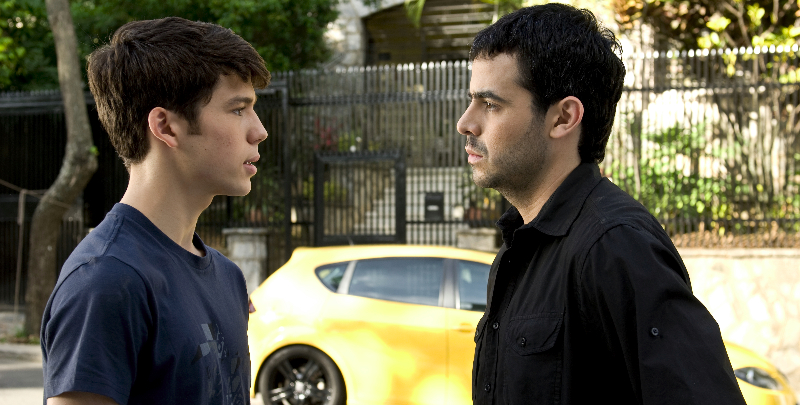John Carroll Lynch is one of those great character actors -- like the late Elisha Cook, Jr. or Harry Dean Stanton (but not nearly as old and grizzled as was the latter) who will someday be given his own page-or-two appreciation in a magazine such as Film Comment or Cineaste. Film fans who relish undersung and versatile acting can get their fill of this fine actor now, as -- finally -- he stars in his own, very good little American independent movie, ANYTHING, as a late-middle-aged man named Early, recently widowed, who travels from Mississippi to Los Angeles, first moving in with his uber-controlling sister and her family, and then striking out on his own to find an apartment in Hollywood.
There he meets and begins tentative, oddball relationships with a few of his not-quite-cut-from-the-same-cloth neighbors: a pair of "druggies" downstairs and the transsexual hooker who lives across the hall.
Oh: You're grimacing already? Well, straighten your face and give Anything a shot. As written and directed by Timothy McNeil (shown at right), the movie may be fairly "expected" in terms of what it does and where it goes, but the dialog is often so good -- genuine, specific and occasionally poetic and beautiful -- and the acting absolutely first-rate from the supporting cast on upwards that surrendering yourself to the story will simply happen, and easily, as this movie ambles sweely, sometimes sourly along.
In the leading role, Mr Lynch (above and below) is so quietly perfect and un-showy (he should win an Oscar, but performances this subtle and true seldom do) that he makes Anything and everything that happens believable. And in a tale like this one, that is quite an accomplishment.
In the transvestite role, Matt Bomer, below, makes a very alluring, young, would-be woman, not perhaps quite feminine enough to fool aficionados but very pretty and very believable, all the same. Mr. Bomer manages to be angry and pushy, while simultaneously making his vulnerability and hopefulness apparent, as well. He's a great match for Mr. Lynch, and the two of them work quite some magic to bring the film to fruition.
As that too-controlling sister, Maura Tierney (below, right) also proves a powerhouse in her own way. Again, the role itself may be an obvious one but Tierney's performance helps take it out of the "typical" to give it honest, specific roots.
All of the supporting roles -- from that of the group of "trans" friends to Early's nephew and brother-in-law, and particularly those of the downstairs druggies -- are brought to fine life. Even within the confines of their little screen time, these characters are given fuller, more complex lives than most movies of this genre would supply them.
One of the film's special moments comes early on, as a dinner guest at the sister's home talks too lengthily and embarrassingly about her late and older-than-she husband, whom she loved deeply, even if she did not want to have sex with him. In its oddball and almost comic manner, the scene lays the groundwork for much of what follows. By the time the film has reached its quiet, moving conclusion, with but a single yet most appropriate word spoken, if you are not fully in tune with these complicated people and hopeful for their future, I'll be very surprised.
From Paladin and running just 93 minutes, Anything opens tomorrow, Friday, May 11, in New York City at the AMC Empire 25 and in Los Angeles at Laemmle's Monica Film Center. Elsewhere? I'd hope so, but maybe not. Eventually, though, you'll be able to catch it via DVD or streaming.































































